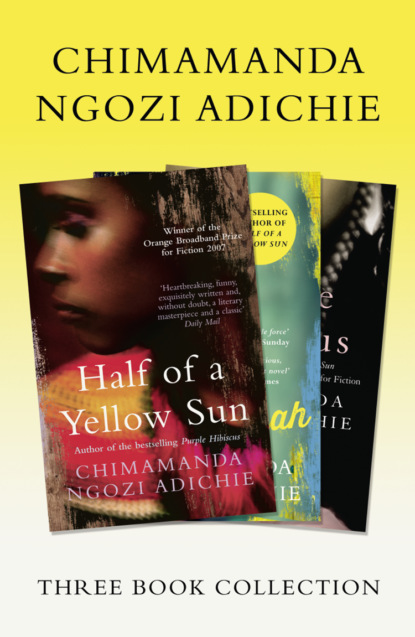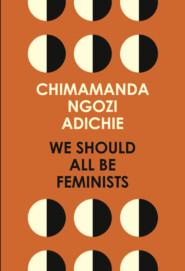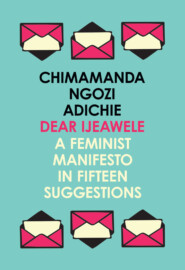По всем вопросам обращайтесь на: info@litportal.ru
(©) 2003-2024.
✖
Half of a Yellow Sun, Americanah, Purple Hibiscus: Chimamanda Ngozi Adichie Three-Book Collection
Автор
Год написания книги
2018
Настройки чтения
Размер шрифта
Высота строк
Поля
Amala mumbled a response. Her face was still to the wall. In the silence that followed, Olanna heard quick footfalls on the corridor outside. She had known this was coming for months now, and yet looking at Amala she felt an ashy hollowness. A part of her had hoped this day would never arrive.
‘Let’s see the baby,’ she said. As she and Odenigbo turned to leave, she noticed that Amala did not turn, did not move, did not do anything to show she had heard.
At the newborn ward a nurse asked them to wait on one of the benches that lined the wall. Olanna could see, through the louvres, the many cots and many crying infants, and she imagined that the nurse would be confused and would bring the wrong baby. But it was the right baby; the full head of softly curled black hair and the dark skin and the widely spaced eyes were unmistakable. Only two days old, and she looked like Odenigbo.
The nurse made to give Olanna the baby, wrapped in a white, woolly blanket, but she gestured to Odenigbo. ‘Let her father hold her.’
‘You know her mother has refused to touch her,’ the nurse said, as she handed the baby to Odenigbo.
‘What?’ Olanna asked.
‘She has not touched her at all. We are using a wet nurse.’
Olanna glanced at Odenigbo, holding the baby with his arms outstretched as if he needed some distance. The nurse was about to say something else when a young couple came in and she hurried over to them.
‘Mama just told me,’ Odenigbo said. ‘She said Amala won’t hold the baby.’
Olanna said nothing.
‘I should go and see to the bill,’ he said. He sounded apologetic.
She held out her arms and as soon as he handed her the baby, the high-pitched crying began. From across the room, the nurse and the couple watched and Olanna was certain that they could tell that she did not know what to do with a howling infant in her arms, that she was incapable of getting pregnant.
‘Shush, shush, o zugo,’ she said, feeling a little theatrical. But the tiny mouth remained open and twisted, and the crying was so shrill, she wondered if it hurt the tiny body. Olanna fit her small finger in the baby’s fist. Slowly the crying stopped but the little mouth remained open, showing pink gums, and the round eyes scrunched up and peered at her. Olanna laughed. The nurse walked across.
‘Time to take her in,’ she said. ‘How many do you have?’
‘I don’t have children,’ Olanna said, pleased that the nurse had assumed that she did.
Odenigbo came back and they walked to Amala’s cubicle, where Mama sat by the bedside, holding a covered enamel bowl. ‘Amala has refused to eat,’ she said. ‘Gwakwa ya. Tell her to eat.’
Olanna sensed Odenigbo’s discomfort before he spoke in a voice that was too loud. ‘You should eat, Amala.’
Amala mumbled something. Finally, she turned her face towards them and Olanna looked at her: a plain village girl curled up on the bed as if she were cringing from one more furious blow from life. She never once looked at Odenigbo. What she must feel for him was an awed fear. Whether or not Mama had told her to go to his room, she had not said no to Odenigbo because she had not even considered that she could say no. Odenigbo made a drunken pass and she submitted willingly and promptly: He was the master, he spoke English, he had a car. It was the way it should be.
‘Did you hear what my son said?’ Mama asked. ‘He said you should eat.’
‘I heard, Mama.’ Amala sat up and took the enamel plate, her eyes focused on the floor. Olanna was watching her. Perhaps it was hate she felt for Odenigbo. How much did one know of the true feelings of those who did not have a voice? Olanna moved closer to Amala, but she was unsure what she wanted to say and so she picked up the tin of glucose, examined it, and placed it back. Mama and Odenigbo had stepped outside.
‘We are leaving,’ Olanna said.
‘Go well,’ Amala said.
Olanna wanted to say something to her but she could not find the words, so she patted Amala’s shoulder and left the cubicle. Odenigbo and Mama were talking beside a water tank, for so long that mosquitoes began to bite Olanna as she stood waiting, so she climbed into the car and pressed the horn.
‘Sorry,’ Odenigbo said, when he got in. He did not say anything about what he and his mother had talked about until they were driving past the campus gates in Nsukka, an hour later. ‘Mama doesn’t want to keep the baby.’
‘She doesn’t want to keep the baby?’
‘No.’
Olanna knew why. ‘She wanted a boy.’
‘Yes.’ Odenigbo removed a hand from the steering wheel to roll his window farther down. She found a guilty pleasure in the humility he had cloaked himself in since Amala gave birth. ‘We’ve agreed that the baby will stay with Amala’s people. I’ll go to Abba next week to see them and discuss – ’
‘We’ll keep her,’ Olanna said. She startled herself by how clearly she had articulated the desire to keep the baby and how right it felt. It was as if it was what she had always wanted to do.
Odenigbo turned to her with eyes widened behind his glasses. He was driving so slowly over a speed bump that she feared the car would stall. ‘Our relationship is the most important thing to me, nkem,’ he said quietly. ‘We have to make the right decision for us.’
‘You were not thinking about us when you got her pregnant,’ Olanna said, before she could help herself; she hated the malice in her tone, the renewed resentment she felt.
Odenigbo parked the car in the garage. He looked tired. ‘Let’s think about this.’
‘We’ll keep her,’ Olanna said firmly.
She could raise a child, his child. She would buy books about motherhood and find a wet nurse and decorate the bedroom. She shifted this way and that in bed that night. She had not felt sorry for the child. Instead, holding that tiny, warm body, she had felt a conscious serendipity, a sense that this may not have been planned but had become, the minute it happened, what was meant to be. Her mother did not think so; her mother’s voice over the phone line the next day was grave, the solemn tone that would be used to talk about somebody who had died.
‘Nne, you will have your own child soon. It is not right for you to raise the child he had with a village girl he impregnated as soon as you travelled. Raising a child is a very serious thing to undertake, my daughter, but in this case it is not the right thing.’
Olanna held the phone and stared at the flowers on the centre table. One of them had fallen off; it was surprising that Ugwu had forgotten to remove it. There was truth in her mother’s words, she knew, and yet she knew, also, that the baby had looked like she had always imagined her and Odenigbo’s child would, with the lush hair and widely spaced eyes and pink gums.
‘Her people will give you trouble,’ her mother said. ‘The woman herself will give you trouble.’
‘She doesn’t want the child.’
‘Then leave it with her people. Send them what is needed but leave the child there.’
Olanna sighed. ‘Anugo m, I’ll give this more thought.’
She put the phone down and picked it up again and gave the operator Kainene’s number in Port Harcourt. The woman sounded lazy, made her repeat the number a few times and giggled before connecting her.
‘How noble of you,’ Kainene said when Olanna told her.
‘I’m not being noble.’
‘Will you adopt her formally?’
‘Yes. I think so.’
‘What will you tell her?’
‘What will I tell her?’
‘Yes, when she’s older.’
‘The truth: that Amala is her mother. And I’ll have her call me Mummy Olanna or something, so that if Amala ever comes back, she can be Mummy.’
‘You’re doing this to please your revolutionary lover.’









